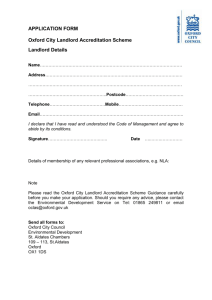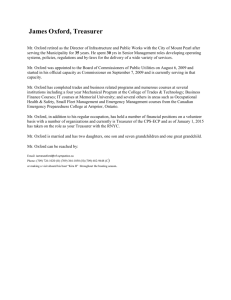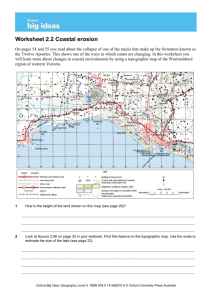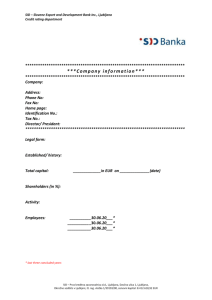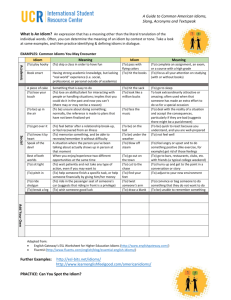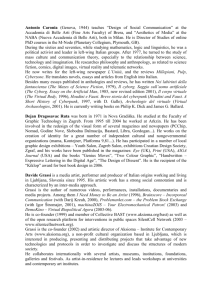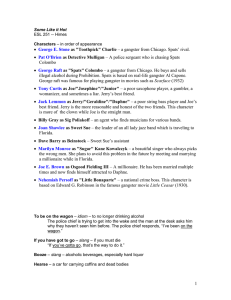FOREIGN LANGUAGES
advertisement
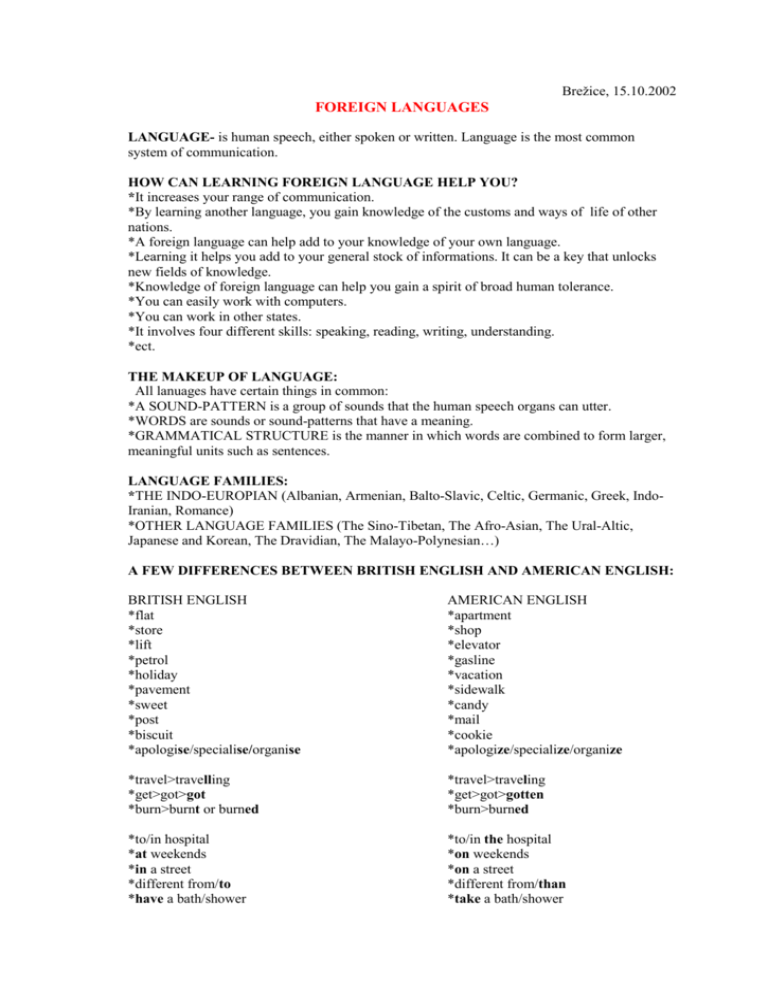
Brežice, 15.10.2002 FOREIGN LANGUAGES LANGUAGE- is human speech, either spoken or written. Language is the most common system of communication. HOW CAN LEARNING FOREIGN LANGUAGE HELP YOU? *It increases your range of communication. *By learning another language, you gain knowledge of the customs and ways of life of other nations. *A foreign language can help add to your knowledge of your own language. *Learning it helps you add to your general stock of informations. It can be a key that unlocks new fields of knowledge. *Knowledge of foreign language can help you gain a spirit of broad human tolerance. *You can easily work with computers. *You can work in other states. *It involves four different skills: speaking, reading, writing, understanding. *ect. THE MAKEUP OF LANGUAGE: All lanuages have certain things in common: *A SOUND-PATTERN is a group of sounds that the human speech organs can utter. *WORDS are sounds or sound-patterns that have a meaning. *GRAMMATICAL STRUCTURE is the manner in which words are combined to form larger, meaningful units such as sentences. LANGUAGE FAMILIES: *THE INDO-EUROPIAN (Albanian, Armenian, Balto-Slavic, Celtic, Germanic, Greek, IndoIranian, Romance) *OTHER LANGUAGE FAMILIES (The Sino-Tibetan, The Afro-Asian, The Ural-Altic, Japanese and Korean, The Dravidian, The Malayo-Polynesian…) A FEW DIFFERENCES BETWEEN BRITISH ENGLISH AND AMERICAN ENGLISH: BRITISH ENGLISH *flat *store *lift *petrol *holiday *pavement *sweet *post *biscuit *apologise/specialise/organise AMERICAN ENGLISH *apartment *shop *elevator *gasline *vacation *sidewalk *candy *mail *cookie *apologize/specialize/organize *travel>travelling *get>got>got *burn>burnt or burned *travel>traveling *get>got>gotten *burn>burned *to/in hospital *at weekends *in a street *different from/to *have a bath/shower *to/in the hospital *on weekends *on a street *different from/than *take a bath/shower SOCIAL SPECIES OF LANGUAGE: *FORMAL language is used in public articles, on TV and radio… *INFORMAL language is used in daily speech. *DIALECT is a form of a language that is spoken in one part of a country. *JARGON is a vocabulary and set of expressions used by a particular group of persons. *SLANG consists of words and phrases that are used in unconventional ways. VOCABULARY: *ACCENT is the emphasis placed on a certain syllable of a word. *BLEND is a word made up of parts of two or more other words. *COGNATES are words in different languages that have the same original source. *COINAGE is an invented word. *COLLOQUIALISM is an informal, but not slang, expression. *ETYMOLOGY is a branch of linguistics (the scientific study of language) that studies the origin and development of words. *HYBRID WORD is composed of parts from two or more languages. *IDIOM is an expression in one language that cannot be accurately translated into another. The meaning of an idiom cannot be seen from the individual words in it. *ILLITERACY is the inability to read and write. *LOAN WORD is a word borrowed from another language, either in its original form or modified. *NEOLOGISM is a newly coined word that has not been generally accepted. THE SPREAD OF ENGLISH LANGUAGE: *United States of America *Canada *South and East Australia *England *North Ireland and a part of Ireland *South Africa *New Zeland *Islands around Cuba *Gvaiana *ect. LITERATURE: -Raymond Murphy: English Grammar in use, Cambridge University press, Cambridge 1985, 1994, page 282-283 -A Scott Fetzer Company: The World Book Encyclopedia- L volume 12, World Book International, USA 1994, 1993, 1992, page 49-55 -Miranda Steel: Oxford word power dictionary for learners of English, Oxford University press, Oxford 2000 -Vili Kos, Miha Mate and others: Atlas sveta za osnovne in srednje šole, Mladinska knjiga Ljubljana, Ljubljana 1996, page 164-165 Pinterič Nina and Jurman Karin, 4.e




